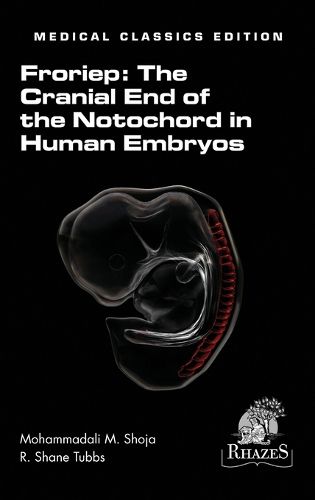Readings Newsletter
Become a Readings Member to make your shopping experience even easier.
Sign in or sign up for free!
You’re not far away from qualifying for FREE standard shipping within Australia
You’ve qualified for FREE standard shipping within Australia
The cart is loading…






This title is printed to order. This book may have been self-published. If so, we cannot guarantee the quality of the content. In the main most books will have gone through the editing process however some may not. We therefore suggest that you be aware of this before ordering this book. If in doubt check either the author or publisher’s details as we are unable to accept any returns unless they are faulty. Please contact us if you have any questions.
Froriep: Cranial End of the Notochord in Human Embryos, the first English translation of August Froriep's seminal study, steps into the pioneering world of 19th-century embryology. Originally published in 1882 as part of a festschrift honoring his mentor, Jacob Henle, this work remains a cornerstone of developmental biology.
The volume begins with a biographical account of Froriep, highlighting his legacy as a student of the great Jacob Henle and his contributions to embryology, including the identification of Froriep's ganglion. A historical perspective on notochord research provides essential context, leading into the translated text of Froriep's classic paper. Froriep's study meticulously documents the cranial end of the notochord in human embryos, supported by precise descriptions of specimens ranging from 1.75 cm to 8.8 cm in body length.
Accompanying the text are Froriep's original black-and-white illustrations, now reproduced in stunning full color to enhance their detail and accessibility for modern readers. The book captures Froriep's extraordinary scientific rigor and his ability to synthesize meticulous observations into enduring scientific conclusions.
Ideal for anatomists, embryologists, and anyone fascinated by the history of science, this book offers a unique glimpse into the methods and insights of a master anatomist. It stands as both a valuable resource for understanding notochordal development and a timeless example of how scientific observation can yield lasting truths.
$9.00 standard shipping within Australia
FREE standard shipping within Australia for orders over $100.00
Express & International shipping calculated at checkout
Stock availability can be subject to change without notice. We recommend calling the shop or contacting our online team to check availability of low stock items. Please see our Shopping Online page for more details.
This title is printed to order. This book may have been self-published. If so, we cannot guarantee the quality of the content. In the main most books will have gone through the editing process however some may not. We therefore suggest that you be aware of this before ordering this book. If in doubt check either the author or publisher’s details as we are unable to accept any returns unless they are faulty. Please contact us if you have any questions.
Froriep: Cranial End of the Notochord in Human Embryos, the first English translation of August Froriep's seminal study, steps into the pioneering world of 19th-century embryology. Originally published in 1882 as part of a festschrift honoring his mentor, Jacob Henle, this work remains a cornerstone of developmental biology.
The volume begins with a biographical account of Froriep, highlighting his legacy as a student of the great Jacob Henle and his contributions to embryology, including the identification of Froriep's ganglion. A historical perspective on notochord research provides essential context, leading into the translated text of Froriep's classic paper. Froriep's study meticulously documents the cranial end of the notochord in human embryos, supported by precise descriptions of specimens ranging from 1.75 cm to 8.8 cm in body length.
Accompanying the text are Froriep's original black-and-white illustrations, now reproduced in stunning full color to enhance their detail and accessibility for modern readers. The book captures Froriep's extraordinary scientific rigor and his ability to synthesize meticulous observations into enduring scientific conclusions.
Ideal for anatomists, embryologists, and anyone fascinated by the history of science, this book offers a unique glimpse into the methods and insights of a master anatomist. It stands as both a valuable resource for understanding notochordal development and a timeless example of how scientific observation can yield lasting truths.